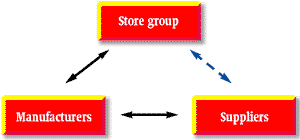Against
the background of new technologies, global markets and developments
in consumer behaviour, changes are taking place in the clothing business
that no-one operating in the sector can afford to ignore.
Competitive advantage
through co-makership.
The clothing business is currently engaged in a process
of rapid change, driven by the globalisation of markets on the one hand
and the application of information and communication technology (ICT)
to strategic business information systems and quality control on the
other. Global clothing businesses are responding to these developments
by looking for co-operation with like-minded suppliers. So, while there
is increasing emphasis on quality, the value of strategic alliances
is growing. At ISC we are keen to establish such a strategic alliance,
with the focus on co-makership.

Mutual advantage
In a situation in which a store group purchases garments
from clothing manufacturers all over the world (that in turn source
haberdashery and other items from a wide variety of suppliers), it is
extremely difficult to maintain a reliable grip on quality. However,
once the store group has established global agreements with suppliers
on issues such as specifications, quality, volumes, rates, regulations
and monitoring, it can then be confident that orders placed to manufacturers
will meet its requirements. The result: the store group gets a grip
on the garment supply process as a whole. Let's see what this means
in practice for the store group organisation.
The implications for purchasing
The demands of today's customers can only be met when global
purchasing is backed up with state-of-the-art information technology.
In these circumstances, a strategic alliance with a global supplier
can lead to significant economies of scale, while clear co-makership
agreements create an immediate advantage when calculating volumes and
prices. The advantages of establishing and controlling links to suppliers
of component parts are already well established in a number of industries.
Automotive and aircraft manufacturers, for instance, ensure that the
supply of parts for the components they use meets stringent, universal
standards in terms of quality and price. In the food industry, manufacturers
of containers and packaging also have to comply with standards set by
the store groups with their key suppliers. Our co-makership model has
been designed for the suppliers of shoulderpads that clothing manufacturers
use to make garments for sale in your stores, but the logic applies
equally to other suppliers. As a specialist in our particular product
area, we also offer support in the fields of design, logistics and quality
control.
The implications for designers
Co-makership gives your designers the opportunity to bring
their ideas about fabrics, colours and textures to garment component
suppliers like us, who can then act as partners in developing new products.
If required, we can also provide information from our international
network about fashion trends. And, as a specialist in our field, we
offer quality leverage, i.e. the right price/quality combination, harmonising
the lifetime of all components in each product or label.
The implications for logistics
As far as physical distribution is concerned, we are willing
to share the benefits of our information systems. We deliver globally
according to the Just-in-Time principle (the right quantities as and
when they are needed), so that production is not held up, but there
is also no need to tie up capital in stocks. Our advanced tracking systems
provide the means to keep a close eye on the status of products in transit
so that they arrive at the right time at the right place. If required,
we can help establish fast, reliable communication links between your
warehouses and/or stores and suppliers. We can also add useful information
to the product itself such as customer-specific bar codes.
The implications for quality control
Well-designed clothing is something everyone is looking for,
but, as a prominent store group, you need to be sure that the clothing
you sell does not harbour hidden flaws that can damage your reputation
as a quality supplier. We are convinced that setting a clear set of
quality norms for suppliers is the right strategy for store groups as
they approach the new millennium. We are able to guarantee uniform quality,
providing you with a single contact for information about a range of
qualities world-wide. You receive feedback about deliveries and reports
on washing instructions, environmental aspects, etc. You also get full
information on quantities and schedules and can thus cross-check deliveries.
This all adds up to a guarantee of quality that you can offer to your
customers, thereby minimising complaints and enhancing your reputation
as a reliable supplier of quality clothing.
The results for the business
Working with partners to develop a clear set of quality norms
and applying quality leverage. Combining market intelligence to create
the products that customers want. Using the best available technologies
to keep track of components and get them to market on time. These are
just some of the potential benefits of a strategic alliance. Another
vital component is maintaining your company's reputation. Quality plays
an important role, but in a world in which the behaviour of businesses
that operate internationally is increasingly in the spotlight, none
of us can afford to be complacent about our image. In future we can
expect to face even closer scrutiny from shareholders, employees, the
media, and the public at large. Activities in one part of the world
will determine reputation and therefore profitability in regions thousands
of miles away. The companies best equipped to adapt to this new environment
will be those that are able to anticipate issues, maintain open and
factual communications, and present clear, credible explanations of
their policies.
Next steps
Given the changes we have sketched in the world of clothing
and the pace of developments in ICT, we believe that the time is now
ripe to look at a strategic alliance. By working closely together, we
are confident we can build a viable system tailored to your specific
needs. Our prime objective is simply to allow your store group, in collaboration
with clothing manufacturers and haberdashery suppliers, to get a better
grip on the final product. When all's said and done, our interests are
the same as yours: we both want to offer customers quality clothing
that represents the very best value for money. Let's discuss the further
steps required to achieve this together.

 

|
|


